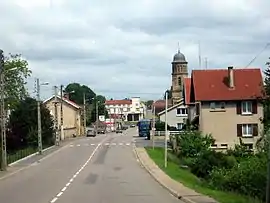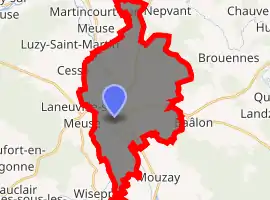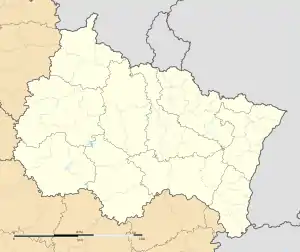Stenay
Stenay (French pronunciation: [stənɛ]) is a commune in the Meuse department in Grand Est in north-eastern France.
Stenay | |
|---|---|
 A general view of Stenay | |
.svg.png.webp) Coat of arms | |
Location of Stenay 
| |
 Stenay  Stenay | |
| Coordinates: 49°29′27″N 5°11′11″E | |
| Country | France |
| Region | Grand Est |
| Department | Meuse |
| Arrondissement | Verdun |
| Canton | Stenay |
| Intercommunality | Pays de Stenay |
| Government | |
| • Mayor (2014–2020) | Stéphane Perrin |
| Area 1 | 27.16 km2 (10.49 sq mi) |
| Population (2017-01-01)[1] | 2,597 |
| • Density | 96/km2 (250/sq mi) |
| Time zone | UTC+01:00 (CET) |
| • Summer (DST) | UTC+02:00 (CEST) |
| INSEE/Postal code | 55502 /55700 |
| Elevation | 163–303 m (535–994 ft) |
| 1 French Land Register data, which excludes lakes, ponds, glaciers > 1 km2 (0.386 sq mi or 247 acres) and river estuaries. | |
Its inhabitants are called Stenaisiens.[2]
History

Église Saint-Joseph de Cervisy
It was one of the last villages to experience fighting during the First World War.[3] Stenay was captured on 11 November 1918 by the American 89th Division under General William M. Wright only hours before the Armistice went into effect. The 89th lost 365 men to howitzer fire.[4]
Toponymy
According to local tradition in antiquity, there was a temple of Saturn from which the village gets its name.
Old names chronlogically are[5][6]
- Sathanagium, Sathonagium (714) ; Astenidum (877) ; Astanid (888) ; Satenaium (xe siècle) ; Sathaniacum (xe siècle) ; Sathinidium (1036) ; Sathanacum (1069) ; Setunia (xie siècle) ; Sathanacum villam (1079) ; Satiniacum, Sathiniacum (1086) ; Sathanaco (1108) ; Sathanacensi (1157) ; Sathaniaco (1159) ; Sathanai (1173) ; Sethenac (1208) ; Settenai (1243) ; Sethenai (1264) ; Sathenay (1276, 1399, 1463, 1483, 1549, 1558, 1585) ; Sathanay (1284) ; Satenay (1399) ; Astenæum (1580) ; Satanagus (1630) ; Satanay, Sthenay (1643) ; Stenay (1793).
Tourism
The European Beer Museum (Musée Européen de la bière), founded in 1986, is considered the largest of its kind on the continent.[7][8][9]
See also
References
- "Populations légales 2017". INSEE. Retrieved 6 January 2020.
- Gentilé on the web site www.habitants.fr. Accessed 5 January 2016.
- John Hayes-Fisher , "The last soldiers to die in World War I", BBC News Magazine, 29 October 2008
- Joseph E. Persico. Wright's stated reason for the attack was because "the division had been in the line a considerable period without proper bathing facilities, and since it was realized that if the enemy were permitted to stay in Stenay, our troops would be deprived of the probable bathing facilities there." World War I: Wasted Lives on Armistice Day. History Net.
- Félix Liénard, Topographical Dictionary of the Meuse Department , 1872.
- Des villages de Cassini aux communes d'aujourd'hui: Commune data sheet Stenay, EHESS. (in French)
- "Musée de la bière". Retrieved 2018-08-31.
- "Meuse tourism". Retrieved 2018-08-31.
- "Meuse tourism". Retrieved 2018-08-31.
External links
| Wikimedia Commons has media related to Stenay. |
- Stenay tourist office
- Stenay and the Myth
- Moulin le Cygne the Myth of Satan [ web.archive.org] History of the town
This article is issued from Wikipedia. The text is licensed under Creative Commons - Attribution - Sharealike. Additional terms may apply for the media files.
